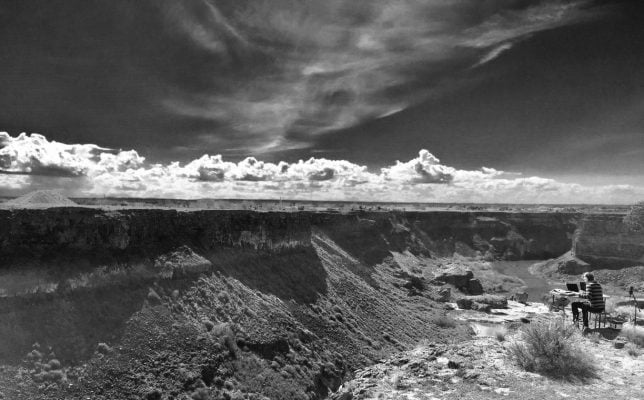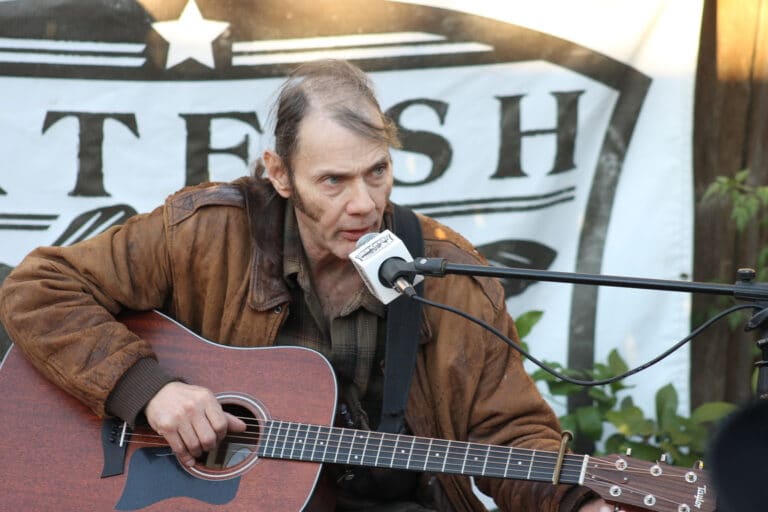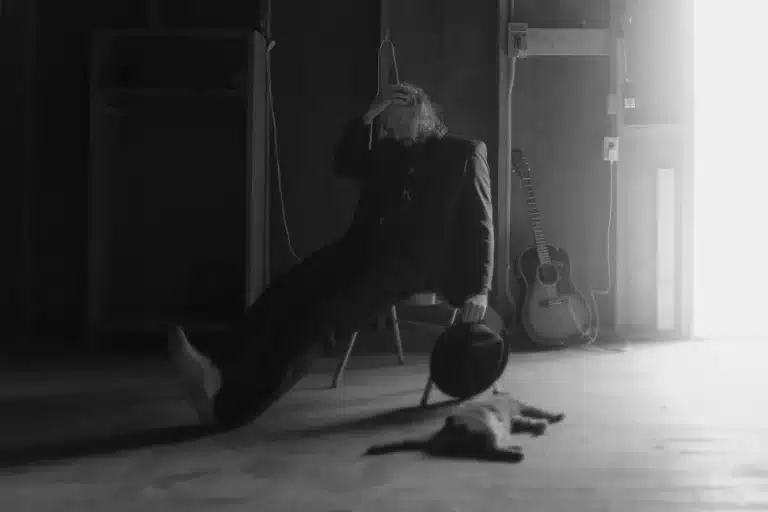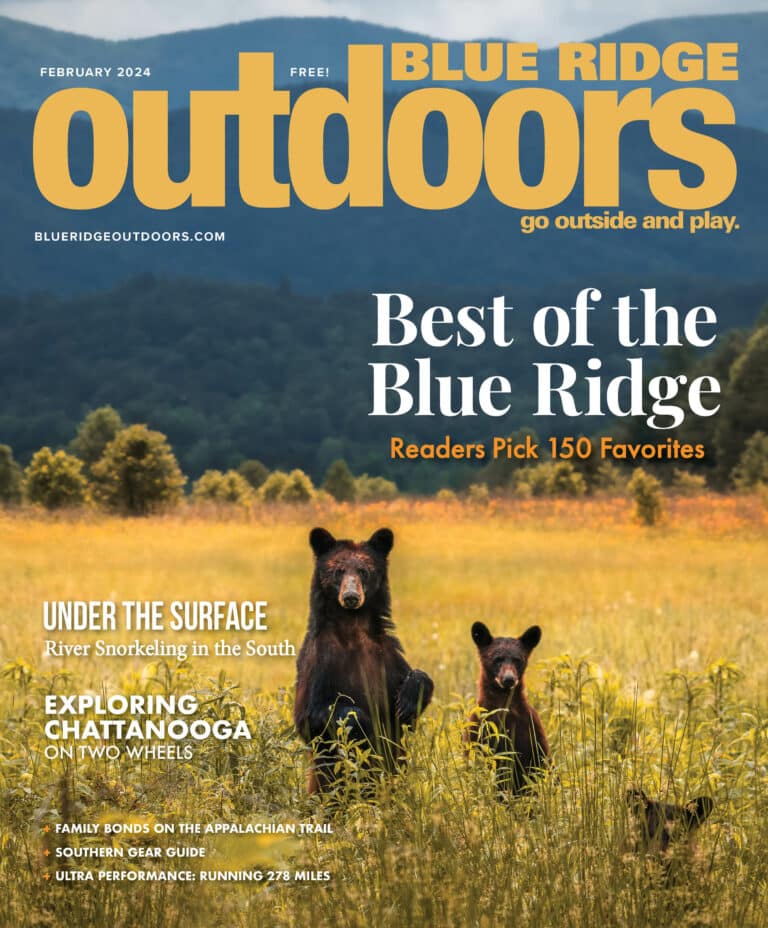Go outside and play.
I have no idea if singer/songwriter Korby Lenker has ever seen our magazine, but he unknowingly borrowed our motto when he set out to record his seventh record, Thousand Springs.
For his latest project, Korby went outside. And he played. Eschewing the confines of a recording studio, Korby got his hands on some portable recording gear and let the songs in his head drive him to where they should be recorded. He ended up, among other places, at the Snake River Canyon, the front porch of his parents’ house, and the Standing Rock Reservation, ultimately recording pieces of the record in seven states.
This record, in every sense of the word, was an adventure in its making.
I recently caught up with Korby to chat about recording outside, our premiere of “Late Bloomers,” and where he might want to take some folks for an intimate outdoor concert.
BRO – What was the biggest challenge you faced in this untraditional, go-it-alone approach to recording?
KL – Mostly, there were just a lot more variables. In a dedicated studio, the conditions are always the same. Outside, you’re dealing with changing weather, the occasional passing car, plane, train, even in remote areas. Also, it takes a lot longer. When I first started doing it, getting sounds and levels and setting up tracks and trying not to get sunburned, it was just a constant hassle. After a few days, I stopped fighting it and decided that the inconsistencies and extraneous noises would be part of the experience, both mine and the listener’s. For instance, in “Late Bloomers,” I recorded the vocals out on my parents’ front porch in Sandpoint, Idaho. They live about a quarter of a mile from the Union Pacific railroad line. Trains pass every twenty minutes. I tried to time my vocal passes accordingly, but in the middle of the best take a train went by, whistling all low and lonely. When I listened back, it sounded like it was part of the track. So I left it in. You can hear it at the top of the third verse. That kind of stuff is all over the place on Thousand Springs.
BRO – After recording in such beautiful and far flung places, have you spoiled the recording studio experience for yourself?
KL – Maybe! The technology has come so far that, these days, you can get world class tones from very small machines. In setting out to make Thousand Springs, it was important to me that I not make something second rate, in terms of the quality of the audio. Once that problem was solved, thanks to Universal Audio’s Apollo Twin, I felt like I could kind of do anything I wanted anywhere I wanted to do it. The longer I’ve made music, the less I care about perfection. Especially studio perfection. Plug-ins have gotten so powerful that the studio tricks that once separated expensive sounding records from everything else are now too easy to come by and, thus, irrelevant. In a way, we’ve come full circle and it’s once again about two things: a song and a performance. Everything else just gets in the way.
BRO – For many of the songs and recording sites, there seems to be a symbiotic relationship. Did the song dictate where you recorded it?
KL – Definitely. This might sound crazy, but if the written song sounded like nighttime, I tried to record it that way. That was the case for the first track, “Northern Lights.” I feel like it sounds like a wide open night sky. Maybe that’s because I recorded it at Craters Of The Moon National Monument on a night in late April when I had the whole campground to myself. I’ve never seen so many stars as I did that evening, before or since. Another song, “Last Man Standing,” was recorded at the Standing Rock Reservation in South Dakota. It’s about Chief Sitting Bull, and I was able to record it, with permission of the tribe, on the reservation and very close to the Sitting Bull memorial. An amazing, humbling honor. The energy of a place gets into the music. How can it not?
BRO – We are premiering “Late Bloomers” this week on Trail Mix. What’s the story behind the song?
KL – My friend Robby Hecht and I wrote “Late Bloomers” at his house in East Nashville. He is a full time singer/songwriter too, and one day we were sitting around complaining about our jobs. I’m kind of embarrassed to say that. I mean, making music for a living is a hard job, with almost zero security, but it’s an amazing job, too. That particular day, we were a little more focused on the challenges of it. Somewhere in our conversation, the tone shifted, and we felt like it’s going to be okay. Like, maybe going for this music thing like crazy would turn out alright in the end. Like, we all know people who are more successful that us at what they do, but maybe that’s because it’s not our turn yet. “Late Bloomers” is a hopeful song. I’m a hopeful person.
BRO – If you could take a small group of friends to any of these locations to play for them, which would it be?
KL – Great question! Actually, there is a company that does floating trips on the Salmon River in central Idaho’s Frank Church-River of No Return Wilderness as package deal that features a songwriter and an intimate circle of their fans. It’s a week long trip, I think. You raft during the day and have a little concert at night by the river, under the stars. My buddy Darrell Scott did it and said it’s magical. I’m working on a trip for either next year or the year after. That would be a dream come true and a perfect setting for a Thousand Springs concert.
Korby Lenker is in Prosser, Washington, tomorrow evening before heading to Sandpoint, Idaho, on Friday to celebrate the release of the new record with family, friends, and fans.
Speaking of the new record, we have the premiere of “Late Bloomers,” recorded in Sandpoint, right here! Enjoy!
For more information on Korby Lenker, the new record, and when you can catch him live, please visit his website.
And be sure to listen to Korby’s “Northern Lights,” along with tracks from Kellen of Troy, Moon Hooch, and Slaid Cleaves, on this month’s Trail Mix.








